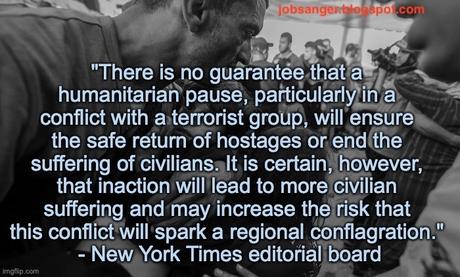
This op-ed is by the editorial board of The New York Times:
Four weeks ago, Israel began its military campaign to defeat Hamas, in retaliation for the attack on Oct. 7 that killed more than 1,400 people, kidnapped some 240 others and destroyed a fundamental sense of security for all Israelis. Israel has a right to defend itself against this threat at its border, and the United States, its closest ally, has rightly pledged to stand by its side until that sense of security is restored.
But the fight against Hamas is not a war against another nation, one that respects international law or the laws of war. Hamas is a terrorist group, one whose founding charter called for nothing less than the destruction of the Jewish state. “Israel will exist and will continue to exist until Islam will obliterate it, just as it obliterated others before it,” the group’s founding charter says in its preface, quoting Hassan al-Banna, the founder of the Muslim Brotherhood. And while it may cling to the idea that it represents Palestinians, Hamas has shown that it has little regard for the lives of civilians in Gaza: Hamas militants have long hidden themselves in mosques and schools and hospitals, intentionally placing civilians in harm’s way.
People around the world, including in the United States, who have justified the attacks by Hamas would do well to understand exactly what this group continues to stand for.
This situation makes Israel’s fight against Hamas exceptionally difficult. As a liberal democracy, the only one in the Middle East, Israel has made a commitment under international law to protect Palestinian civilians while pursuing its military objectives. While it is true that Hamas has made no such commitment, Israel holds itself to a different, higher standard. It cannot allow anger and the desire for vengeance to undermine its moral obligations.
After weeks of airstrikes by Israel and the continued firing of rockets by Hamas, civilians in Gaza have paid a grave price. Thousands have lost their lives or suffered serious injuries. As reporters for The Times detailed, Gazans under siege “say there is a surge of severely injured children entering hospitals, doctors operating without anesthesia and morgues overflowing with bodies.” There are shortages of food, water and fuel needed to power everything from desalination plants to generators.
That is why so many of Israel’s allies, including President Biden and Secretary of State Antony Blinken, have called for a humanitarian pause to see to the urgent and immediate needs of civilians. Restoring access to food and safe drinking water should be first priorities, as well as delivering medical supplies and other essential aid. Israel has expressed concern that aid will only be diverted to support Hamas, but it is worth trying to get it to the civilians who desperately require it.
While Prime Minister Benjamin Netanyahu has so far resisted them, those calls have grown louder and more insistent after Israel’s recent bombardment of the Jabaliya neighborhood in Gaza, which Israel said targeted Hamas militants located there. UNICEF, a children’s aid organization, described the damage as “horrific and appalling,” and it said in a statement that the attacks follow weeks of bombardment “that have reportedly resulted in more than 3,500 children killed.”
A pause in hostilities between Hamas and the Israel Defense Forces would not be, as Mr. Netanyahu declared recently, a surrender to terrorism, nor is a pause the equivalent of a cease-fire, as a White House official noted. Israel has warned that a blanket cease-fire would accomplish little at this point other than allowing Hamas time to regroup.
A humanitarian pause, in contrast, would give some relief to Gazan civilians and allow Israel to make progress on another key part of its objectives: the release of hostages. Two American hostageswere freed during an earlier brief pause in shelling, and another pause, or a series of them, could allow more of the hostages still believed to be held by Hamas a chance at being returned to their families.
A humanitarian pause would also allow more of the millions of civilians who remain in Gaza an opportunity to move to relative safety until the hostilities end. The Rafah border crossing was opened earlier this week, allowing hundreds of foreigners, including dozens of Americans, to leave Gaza and enter Egypt.
For any such measure to be effective, both sides in this conflict must abide by it. Hamas would have to agree, through its interlocutors, to stop launching rockets at Israel. Arab countries in the region should also put pressure on Hamas to release all of its hostages, which include many women and children.
There is no guarantee that a humanitarian pause, particularly in a conflict with a terrorist group, will ensure the safe return of hostages or end the suffering of civilians. It is certain, however, that inaction will lead to more civilian suffering and may increase the risk that this conflict will spark a regional conflagration. Already, supporters of Hamas in the region and elsewhere are using the deaths of Palestinians to urge Hezbollah and other armed groups to join the fight against Israel — while absolving Hamas for its role in Gaza’s suffering.
Israel’s leaders have tried from the outset of this conflict to prepare their country for a long war, and a humanitarian pause is unlikely to change that fact. But it is a vital step to ease the burden on civilians in Gaza, and to allow international aid agencies, which are essential to life in Gaza, to keep functioning. Israeli officials have so far been willing to hear the concerns of allies who have pressed Israel to live up to its commitments to the laws governing conflict. Those laws are designed both to regulate conduct during hostilities and also to create a baseline of humanity for what follows.

